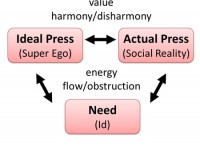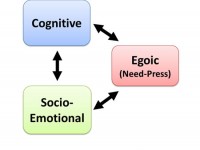In CDF, a person’s psychological profile is determined by evaluating answers to Morris Aderman’s Need/Press Questionnaire, a construct-validated questionnaire used in talent management, performance management, and promotion since 1970. The questionnaire is available on line in English, German, French, and Spanish (www.needpress.com). Questionnaire outcomes ideally complement social-emotional insight deriving from semi-structured interviews. The questionnaire embodies Henry Murray’s personality theory which is based on the notion of psychogenic (inborn) needs and associated pressures as defining a individual’s personality. In NP, clients’ profile is viewed in terms of three foci: self concept, approach to tasks, and interpersonal perspective (emotional intelligence.). Discussing these behavioural clusters in class tremendously helps students distinguish between what is “social-emotional” (developmental) and “psychological” in their own and in clients’ behavior and way of working with others. Students learn to make fine behavioral distinctions and observations; they also learn how to give appropriate and complex feedback to clients, weaving psychological insights into feedback on clients’ present social-emotional frame of reference. In CDF, a person’s psychological profile is viewed as the “glue” that holds his/her competences together, and also as a filter through which adult developmental resources pass on their way to inform the use of competences. In this course,... Read More...
Tag: Psychological Profile
Case Study II: CDF Dimensions in their Interrelationship within a Client’s Unitary Consciousness
This program serves the sole purpose of deepening practical know-how of CDF by bringing together all of its three dimensions. Consequently, it presupposes both a social-emotional and cognitive case study as well as the ability to evaluate and give feedback on the outcome of the Need/Press Questionnaire. The program offers students the opportunity to show themselves and others that they have not only mastered “developmental theory”, but also know how to use it in practice. Writing a second case study involves: Completing a 1-hr social-emotional and 1-hr cognitive interview with a client other than the person engaged in Case Study I (a+b) Transcribing both interviews into English for discussion in the study cohort Evaluating the outcome of the psychological Need/Press Questionnaire Selecting from the social-emotional interview 15, from the cognitive interview 30 short fragments that appear to be structurally relevant for determining developmental profile Presenting a coding sheet of these fragments for each transcribed interview, to be evaluated by the cohort together with the instructor Submitting all materials required for written case study to the Director of Education Attending a feedback session with the Director of Education Giving full feedback to the client, both for self-insight and coaching Read... Read More...
Constructive Developmental Framework (CDF) – Ungekürzter Wikipedia-Artikel
Von Bruno Frischherz - Das Constructive Developmental Framework (CDF) ist eine psychologische Entwicklungstheorie und das entsprechende Assessmentinstrument, das auf empirischer Forschung beruht. Der CDF-Methodologie liegt die Annahme zugrunde, dass jedes Individuum sich aktiv eine eigene “Welt” konstruiert, die von anderen Weltmodellen verschieden und lebenslang im Entstehen ist. Die CDF-Methodologie umfasst drei Assessmentinstrumente, je eines für die sozial-emotionale und kognitive Entwicklung einer Person, und eines für das psychologische Profil. Die CDF-Methodologie kommt überall dort zur Anwendung, wo es darum geht, Erwachsene bei ihrer lebenslangen Entwicklung zu unterstützen. Die Methodologie wird am Interdevelopmental Institute (IDM) in verschiedenen Programmen unterrichtet. Die empirische Grundlage der Methodologie gründet in der Forschung, die vor 40 Jahren an der Kohlbergschule begann. Diese Methodologie wurde seit 1998 durch Otto Laske durch das dialektische Denken der Frankfurter Schule und Hegel’s Philosophie erweitert. Diese Erweiterung zeigt sich vor allem darin, dass CDF strikt zwischen sozial-emotionaler und kognitiver Entwicklung unterscheidet und beide empirisch in Beziehung zueinander setzt. Download: Frischherz_2012_Constructive_Developmental_Framework_CDF_Wikipedia Read More...

